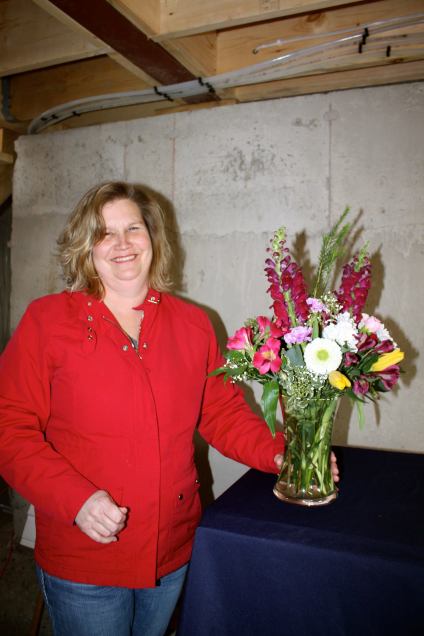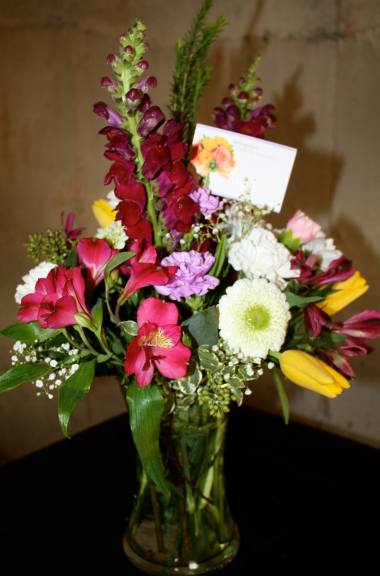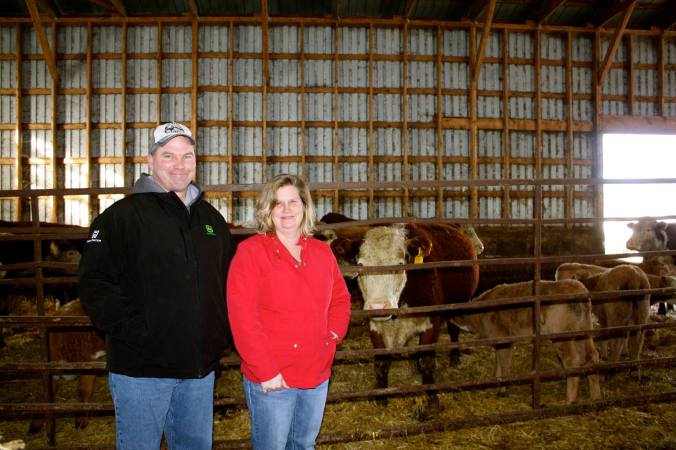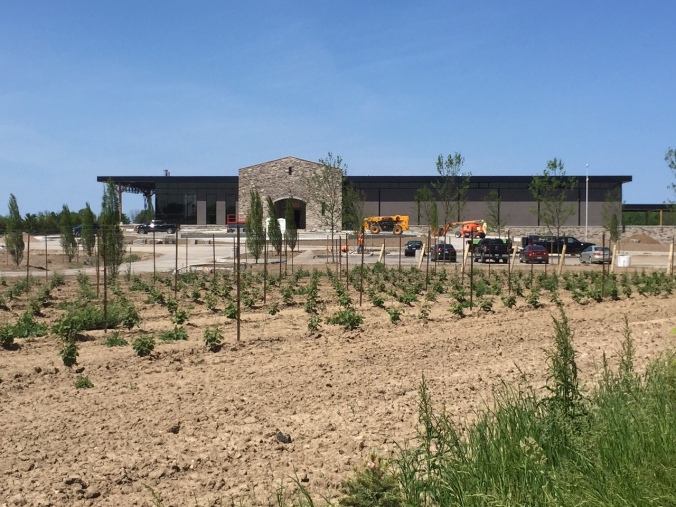Sarah Taylor has found an untapped flower market in the farming community and in her rural neighbours. If you are interested in getting in touch with Sarah or to order arrangements, you can check out her Facebook Page
By Courtney Denard
 Beef farmer, florist, and DHI customer service representative are just a few of the titles Sarah Taylor can attach her name to. Wife, mother, and completely charming are a few more.
Beef farmer, florist, and DHI customer service representative are just a few of the titles Sarah Taylor can attach her name to. Wife, mother, and completely charming are a few more.
I approached Sarah for an interview for this series after she showed up at my dairy farm a few days before Christmas with a giant bouquet of beautiful fresh flowers.
She was so bubbly and happy and couldn’t wait to deliver the holiday surprise my husband had arranged. I on the other hand was a little confused.
I knew Sarah mainly as one of our DHI reps so I had no idea why she was bouncing up my driveway bouquet in-hand.
Turns out Sarah, who runs Taylor Made Cattle Co. in Kemble with her husband Mark and their children Mitch and Katelyn, recently started Serendipity Florals, a full-service flower shop serving Owen Sound and surrounding area.
Her target clients are farmers and country folk, many of whom she’s gotten to know through her work in the Ontario agriculture sector.
The following is a selection of our interview that I put together just in time for Valentine’s Day, one of the biggest flower delivery days of the year.
Q: Tell me about Serendipity Florals?
 A: I started the business in August 2015 after a young girl asked me to do her wedding flowers from the varieties I grow here on the farm.
A: I started the business in August 2015 after a young girl asked me to do her wedding flowers from the varieties I grow here on the farm.
I had a worked in a flower shop on weekends when I was younger so I already had a hand in it and said ‘why not.’
After her wedding, a friend of the bride wanted to use my flowers too so that was the start of it.
When Valentine’s Day rolled around last year I told my dairy farmer guys that I work with that if they were looking for flowers for their wives and girlfriends I could do them.
I kind of had to pound the pavement and talk myself up but now I am doing more and more. I did eight weddings in 2016 and I already have seven booked for this year.
Q: What kind of flowers do you grow on your farm?
A: I have everything from gladiolas to dahlias to roses to carnations. I have lots of greens like boxwood, plus hypericum berries, tulips, daffodils and oriental lilies.
The list goes on but I recently grew mini cabbages, which was a major coup because they’re very expensive at wholesale at $35 a bunch.
I started growing more of my own varieties because I was unhappy with the quality of flowers I was buying in.
Often flowers that are brought in were cut in Holland two weeks prior and been through five different hands and they look like that.
Because my brides can come to the farm and pick their own flowers directly from the garden, they’re guaranteed freshness.
 Q: What are brides looking for in flowers this year?
Q: What are brides looking for in flowers this year?
A: Everybody likes the bohemian look and that’s mostly greens like Australian greens.
I am trying to grow things that look like that here and sell them on it because it’s more affordable.
Peonies are big time right now too so I am growing a number of different varieties.
Q: What’s it like delivering flowers to farmers?
A: Farmers ask me all the time, ‘can you bring flowers?’ and I say ‘sure’ because I am on the road anyway.
I have been selling out of different locations in the rural community, which works out for them and works out for me.
I’m in my DHI clothes half the time but the recipients are still surprised and they’re still happy!
The best part is the look on their face when I arrive with a bouquet because really, everybody likes to get flowers!
Q: Has there been a particularly special delivery you’d like to share?
A: I’m not sure I can speak about this without crying but I have a friend I went to high school with who had been adopted by a dairy farming couple.
With both of her adoptive parents gone she was living in the U.S. and had been looking for her birth mom for years.
She eventually found her here in Ontario and asked me to deliver a bouquet to her on Mother’s Day.
I called her birth mom and told her I was a florist from Owen Sound and I had a delivery for her. She couldn’t believe that her daughter had found her after all these years.
A few months after the delivery, my friend invited me to join her and her birth mom for a visit and we all cried like babies.
Turns out, her birth mom was a dairy farmer’s daughter too.
Q: Because this is an Ag Women’s Network feature, when did you get involved with the association?
A: I joined AWN right after it started. I thought it was good because we’re all women in the agriculture industry and we all have the same take on things.
It’s nice to have a place to vent or to ask ‘am I the only one?’ or to admit that you’re stone bone tired but you still have to go out and do chores.

Sarah and her husband Mark. Together with their children, Mitch and Katelyn, they run Taylor Made Cattle Co. in Kemble
Q: What’s it like being a woman in agriculture?
A: We’re women doing the same things as men and we know just as much as they do but for some reason that doesn’t get counted for sometimes.
We’re out there working along with our husbands but they’re the ones who get the voice and get taken seriously.
I’ll tell farmers what I think they should do with their calves and some of them just look at me and say, ‘oh.’
I’m starting to get more respect now. It took about three to four years but once you show you can actually do something you get taken more seriously.
Q: Is there a special ‘women in ag’ issue that you hold close to your heart?
A: For me it’s about raising kids and running a farm.
We bought our cows when we had just had our daughter Kate. I was trying to do chores, Mark was working on a beef farm and milking for someone else, and I couldn’t do it all at the same time.
Katelyn was really bad because she lost her mind when I stepped out of her line of sight but I still had to get the chores done.
We seem to have help for everything else so why can’t we have help in the barn for the mothers and young kids?
I see it all the time in my job and I believe it’s one of the biggest set backs- moms need some help.
I firmly believe if you can spend it in the barn you can spend it in the home. It never fails that there’s nothing new in the house because all the money is spent on the farm but she needs a dishwasher because she can’t keep up!
Q: So last question. What are your plans for Valentine’s Day?
A: I’ll be delivering flowers of course and then ordering out supper for my three valentines. I’ll probably have a calf or two that day too.


 In the spirit of these profiles helping others, are you willing to share a mistake you made but taught you something important?
In the spirit of these profiles helping others, are you willing to share a mistake you made but taught you something important?